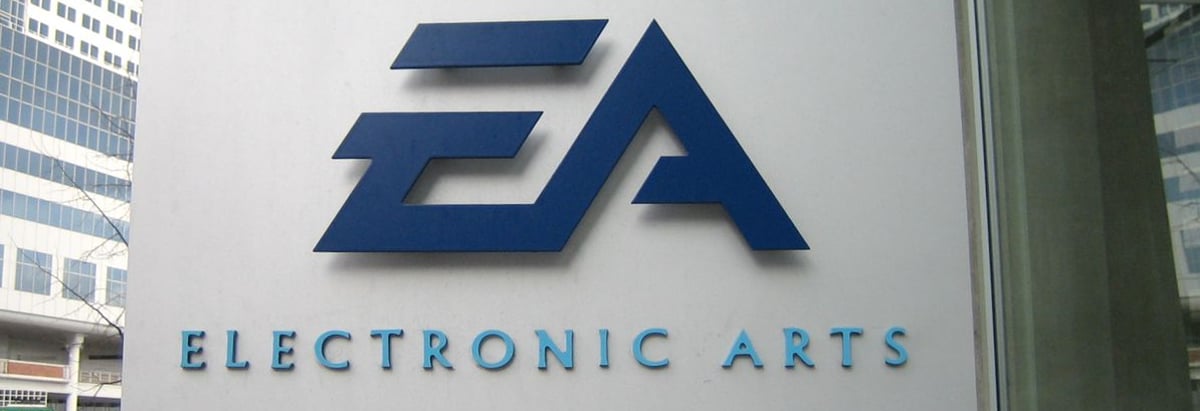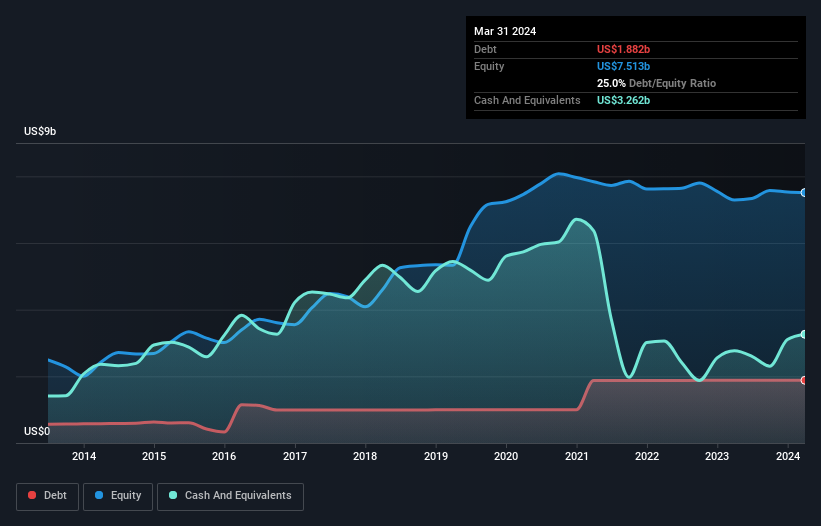- United States
- /
- Entertainment
- /
- NasdaqGS:EA
These 4 Measures Indicate That Electronic Arts (NASDAQ:EA) Is Using Debt Safely

Some say volatility, rather than debt, is the best way to think about risk as an investor, but Warren Buffett famously said that 'Volatility is far from synonymous with risk.' When we think about how risky a company is, we always like to look at its use of debt, since debt overload can lead to ruin. We can see that Electronic Arts Inc. (NASDAQ:EA) does use debt in its business. But the more important question is: how much risk is that debt creating?
What Risk Does Debt Bring?
Debt is a tool to help businesses grow, but if a business is incapable of paying off its lenders, then it exists at their mercy. In the worst case scenario, a company can go bankrupt if it cannot pay its creditors. However, a more usual (but still expensive) situation is where a company must dilute shareholders at a cheap share price simply to get debt under control. Having said that, the most common situation is where a company manages its debt reasonably well - and to its own advantage. The first thing to do when considering how much debt a business uses is to look at its cash and debt together.
See our latest analysis for Electronic Arts
How Much Debt Does Electronic Arts Carry?
As you can see below, Electronic Arts had US$1.88b of debt, at March 2024, which is about the same as the year before. You can click the chart for greater detail. However, it does have US$3.26b in cash offsetting this, leading to net cash of US$1.38b.

How Strong Is Electronic Arts' Balance Sheet?
The latest balance sheet data shows that Electronic Arts had liabilities of US$3.09b due within a year, and liabilities of US$2.82b falling due after that. On the other hand, it had cash of US$3.26b and US$565.0m worth of receivables due within a year. So its liabilities total US$2.08b more than the combination of its cash and short-term receivables.
Since publicly traded Electronic Arts shares are worth a very impressive total of US$37.0b, it seems unlikely that this level of liabilities would be a major threat. But there are sufficient liabilities that we would certainly recommend shareholders continue to monitor the balance sheet, going forward. Despite its noteworthy liabilities, Electronic Arts boasts net cash, so it's fair to say it does not have a heavy debt load!
Fortunately, Electronic Arts grew its EBIT by 8.1% in the last year, making that debt load look even more manageable. When analysing debt levels, the balance sheet is the obvious place to start. But ultimately the future profitability of the business will decide if Electronic Arts can strengthen its balance sheet over time. So if you want to see what the professionals think, you might find this free report on analyst profit forecasts to be interesting.
Finally, a company can only pay off debt with cold hard cash, not accounting profits. Electronic Arts may have net cash on the balance sheet, but it is still interesting to look at how well the business converts its earnings before interest and tax (EBIT) to free cash flow, because that will influence both its need for, and its capacity to manage debt. Happily for any shareholders, Electronic Arts actually produced more free cash flow than EBIT over the last three years. That sort of strong cash conversion gets us as excited as the crowd when the beat drops at a Daft Punk concert.
Summing Up
While it is always sensible to look at a company's total liabilities, it is very reassuring that Electronic Arts has US$1.38b in net cash. And it impressed us with free cash flow of US$2.1b, being 119% of its EBIT. So is Electronic Arts's debt a risk? It doesn't seem so to us. Another factor that would give us confidence in Electronic Arts would be if insiders have been buying shares: if you're conscious of that signal too, you can find out instantly by clicking this link.
When all is said and done, sometimes its easier to focus on companies that don't even need debt. Readers can access a list of growth stocks with zero net debt 100% free, right now.
Valuation is complex, but we're here to simplify it.
Discover if Electronic Arts might be undervalued or overvalued with our detailed analysis, featuring fair value estimates, potential risks, dividends, insider trades, and its financial condition.
Access Free AnalysisHave feedback on this article? Concerned about the content? Get in touch with us directly. Alternatively, email editorial-team (at) simplywallst.com.
This article by Simply Wall St is general in nature. We provide commentary based on historical data and analyst forecasts only using an unbiased methodology and our articles are not intended to be financial advice. It does not constitute a recommendation to buy or sell any stock, and does not take account of your objectives, or your financial situation. We aim to bring you long-term focused analysis driven by fundamental data. Note that our analysis may not factor in the latest price-sensitive company announcements or qualitative material. Simply Wall St has no position in any stocks mentioned.
Have feedback on this article? Concerned about the content? Get in touch with us directly. Alternatively, email editorial-team@simplywallst.com
About NasdaqGS:EA
Electronic Arts
Develops, markets, publishes, and delivers games, content, and services for game consoles, PCs, mobile phones, and tablets worldwide.
Excellent balance sheet and good value.
Similar Companies
Market Insights
Community Narratives



